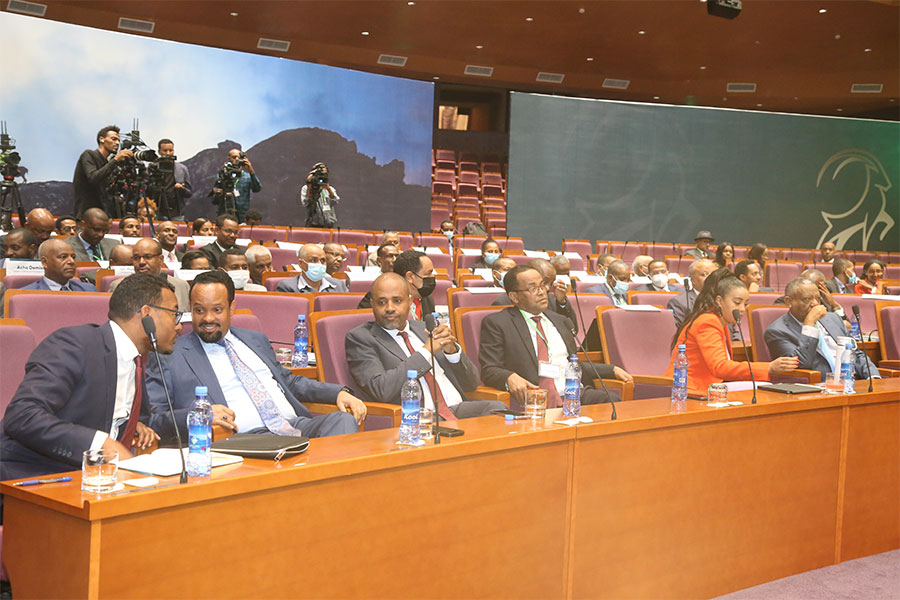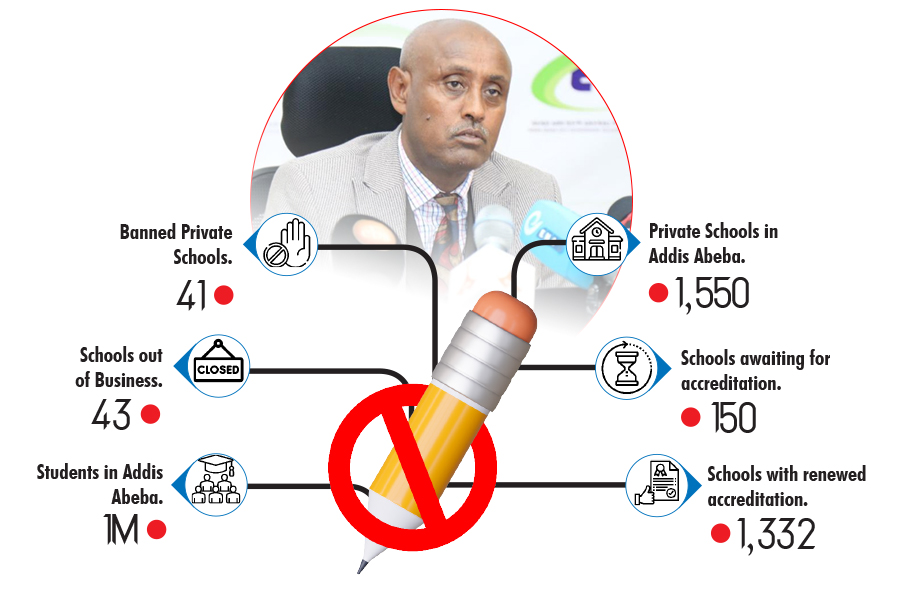
Fortune News | Jun 25,2022
Dec 17 , 2022
By Palesa Libe
The worldwide pandemic has laid bare the vast, systemic inequalities of access and opportunity in education systems. While school closures and the shift to distance learning have taken a heavy toll on hundreds of millions of schoolchildren, underfunded public schools in Africa have been hit the hardest.
Necessity may be the mother of invention, but it is impossible to innovate and advance without sufficient resources or infrastructure.
Between April and August 2020, Human Rights Watch conducted 57 remote interviews with students, parents, teachers, and public officials across Africa about the pandemic's effects on education. When schools closed at the start, many children effectively stopped learning. Many of them shared feelings of stress, anxiety, isolation and depression owing to the lack of contact with their friends and teachers at school.
Some children living in extreme poverty were denied educational opportunities and free school meals, resulting in malnutrition. Girls' education also suffered significant setbacks, as many were expected to perform household chores instead.
But those enrolled in public schools have suffered the most, as the pandemic exacerbated disparities between private and public education across the continent.
A teacher from a rural public primary school told Human Rights Watch that his school did not have computers and that the teachers lacked the computer skills to make remote learning effective. A laboratory administrator from a private school, on the other hand, said that all of her students were using digital services like Google Classroom even before the pandemic. While students and teachers in her school encountered various difficulties related to remote learning, they all managed to keep up with schoolwork. Her school even developed a customised learning platform that enabled teachers to interact with students and conduct online exams.
Transitioning to remote learning has been difficult for poorer and more affluent households. Even tech-savvy parents often feel that remote learning is ineffective. Most parents believe in the importance of physical interaction between students and teachers, expect teacher feedback in the form of marked schoolwork to evaluate their children's progress, and attend school meetings to meet teachers in person.
But while more affluent students were familiar with technology, having computers and mobile phones at home and access to computer labs and high-speed internet, students from lower-income families in rural public schools lacked basic technical skills.
Lesotho, a small lower-middle-income country in southern Africa, is a case in point.
According to a recent United Nations report, only 83pc of the country's children have been able to return to school since in-person classes resumed. In a country like Lesotho, where nearly 40pc of the population is under 18 years of age, and just four out of 10 children enrol in secondary education, this amounts to a full-blown crisis that threatens to reverse decades of progress on learning outcomes and access to quality education.
The high cost of mobile data is one of the most significant barriers. Many children with no computer at home relied on their parent's mobile phones to attend classes, but some parents refused, citing steep data costs and limited storage. Others could not afford to buy a smartphone. But even more affluent parents with children in private schools found it difficult to deal with increased data usage, as the pandemic curbed their incomes, too.
Moreover, the lack of reliable internet access made synchronous instruction difficult, if not impossible. Glitches and connectivity issues often compromised students' learning, and teachers struggled to ensure that students were attentive and understood the material.
Sky-high data prices are a continent-wide problem that negatively affects learning. To address it, governments must force mobile providers to lower prices and offer discounted data plans to students and teachers. Alternatively, governments could grant subsidies to companies willing to provide schoolchildren and their parents with free data and devices.
Remote learning has become an integral part of education, and video-conferencing services like Zoom are likely to stay, regardless of public-health crises. It is essential to develop learning-management systems that enable teachers to deliver lessons effectively, engage students during class activities, and provide accessible tools to assess their progress. Teachers must also become more adept at using these new platforms.
To meet the UN's Sustainable Development Goal for Education (SDG4), which aims to "ensure inclusive and equitable quality education and promote lifelong learning opportunities for all", African governments must address the educational inequalities exacerbated by the pandemic. But first, policymakers must provide the necessary resources to create safe and equitable learning environments for all students, whether they attend a private or public school.
PUBLISHED ON
Dec 17,2022 [ VOL
23 , NO
1181]


Fortune News | Jun 25,2022

Sunday with Eden | Oct 12,2019

Fortune News | Apr 03,2023

Fortune News | Apr 12,2020

Viewpoints | Jun 12,2021

Fortune News | Jun 22,2024

Fortune News | Apr 12,2020

Fortune News | Sep 14,2024

Fortune News | Sep 19,2020

Fortune News | Dec 23,2023

My Opinion | 131970 Views | Aug 14,2021

My Opinion | 128359 Views | Aug 21,2021

My Opinion | 126297 Views | Sep 10,2021

My Opinion | 123912 Views | Aug 07,2021

Dec 22 , 2024 . By TIZITA SHEWAFERAW
Charged with transforming colossal state-owned enterprises into modern and competitiv...

Aug 18 , 2024 . By AKSAH ITALO
Although predictable Yonas Zerihun's job in the ride-hailing service is not immune to...

Jul 28 , 2024 . By TIZITA SHEWAFERAW
Unhabitual, perhaps too many, Samuel Gebreyohannes, 38, used to occasionally enjoy a couple of beers at breakfast. However, he recently swit...

Jul 13 , 2024 . By AKSAH ITALO
Investors who rely on tractors, trucks, and field vehicles for commuting, transporting commodities, and f...

Jul 5 , 2025
Six years ago, Ethiopia was the darling of international liberal commentators. A year...

Jun 28 , 2025
Meseret Damtie, the assertive auditor general, has never been shy about naming names...

Jun 21 , 2025
A well-worn adage says, “Budget is not destiny, but it is direction.” Examining t...

Jun 14 , 2025
Yet again, the Horn of Africa is bracing for trouble. A region already frayed by wars...

Jul 6 , 2025 . By BEZAWIT HULUAGER
The federal legislature gave Prime Minister Abiy Ahmed (PhD) what he wanted: a 1.9 tr...

Jul 6 , 2025 . By YITBAREK GETACHEW
In a city rising skyward at breakneck speed, a reckoning has arrived. Authorities in...

Jul 6 , 2025 . By NAHOM AYELE
A landmark directive from the Ministry of Finance signals a paradigm shift in the cou...

Jul 6 , 2025 . By NAHOM AYELE
Awash Bank has announced plans to establish a dedicated investment banking subsidiary...